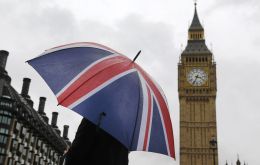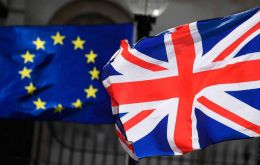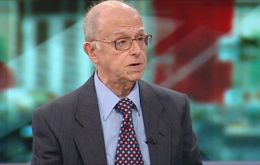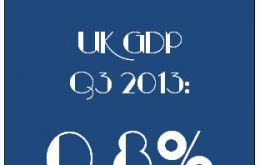MercoPress. South Atlantic News Agency
Tag: British Chambers of Commerce
-
Tuesday, December 18th 2018 - 09:03 UTC
UK economy growth feeling the uncertainty impact of Brexit: weakest since 2009

British economic growth this year and in 2019 looks set to be the weakest since the country’s last recession, due to a freeze in business investment and weak consumer demand ahead of Brexit, the British Chambers of Commerce forecast on Tuesday.
-
Friday, October 19th 2018 - 08:18 UTC
UK foreign trade hampered by Brexit uncertainty, claims British Chambers of Commerce

Brexit is making it difficult for firms to decide whether to import or export, hampering British trade, according to a new survey. Research by the British Chambers of Commerce (BCC) indicated that half of businesses have to consider uncertainty over Brexit when deciding whether to trade internationally.
-
Tuesday, July 3rd 2018 - 07:51 UTC
British Chamber of Commerce says firms running out of patience with Brexit talks

Firms are running out of patience over the lack of progress in the Brexit talks, a major business organization has warned Theresa May. The British Chambers of Commerce has published a list of 23 “real-world” questions that it says urgently need answers as the UK's EU exit approaches.
-
Wednesday, October 18th 2017 - 11:56 UTC
UK inflation climbs to 3% in September, mainly because of the fall in sterling

The UK's key inflation rate hit its highest for more than five years in September, driven up by increases in transport and food prices. The Consumer Prices Index (CPI) climbed to 3%, a level it last reached in April 2012, and up from 2.9% in August. The pick-up in inflation raises the likelihood of an increase in interest rates - currently 0.25% - next month.
-
Tuesday, August 29th 2017 - 19:19 UTC
UK and German commerce chambers call on Brexit negotiators to concentrate on “business issues”

Shared economic interests must be a priority in the Brexit negotiations, UK and German trade bodies have urged. The British Chambers of Commerce (BCC) and the Association of German Chambers of Commerce (DIHK) said uncertainty over “business critical” issues such as workers' rights, tax and customs arrangements needed to be tackled.
-
Thursday, April 17th 2014 - 04:53 UTC
For third consecutive month UK inflation stands below the 2% target rate

The UK inflation rate as measured by the Consumer Prices Index (CPI) fell to 1.6% in March from 1.7% in February, according to the Office for National Statistics (ONS). It is the third consecutive month inflation has been below the Bank of England's 2% target rate, and the lowest rate since October 2009.
-
Thursday, March 6th 2014 - 21:13 UTC
UK interest rate held at 0.5%, making it a record low of five years

UK interest rates have been held at 0.5% for another month, the Bank of England announced on Thursday. The decision by the Bank's Monetary Policy Committee comes five years after the record low level was first introduced.
-
Wednesday, November 20th 2013 - 20:43 UTC
Bank of England enthusiastic about UK recovery, according to November minutes

The UK is in a sustained recovery and does not face major inflation risks, Bank of England policymakers have said. Minutes from the Monetary Policy Committee's November meeting showed the nine members all voted to leave interest rates at 0.5%.
-
Saturday, November 9th 2013 - 18:27 UTC
Bank of England leaves rates unchanged; focus on next week's inflation report

Bank of England has left interest rates unchanged at 0.5% and made no change to its program of quantitative easing, as had been widely expected. The decision came as no surprise as the Bank has said it will not consider a rate rise until the unemployment rate falls below 7%.
-
Friday, August 2nd 2013 - 02:47 UTC
Bank of England leaves rates unchanged as UK economy seems to be picking up

Bank of England's Monetary Policy Committee (MPC) has left interest rates at 0.5%. The key borrowing rate has been at that level since March 2009. MPC also said it would make no change to the £375bn of monetary stimulus it is providing through its quantitative easing program (QE).
